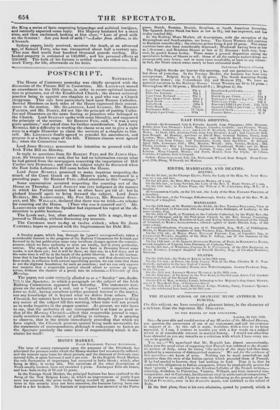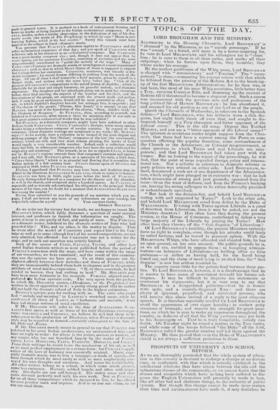TIIE ITALIAN SCII0OL OF DRAMATIC MUSIC ANTERIOR TO PURCELL.
ON this subject, we have received a pleasant letter, in the character of a defence, from the ingenious Mr. Ilocsani.
TO THE EDITOR OF THE SPECTATOR.
London, 3d July 1838,
SI It—In your able and candid review of my Memoirs of the Musical Drama, you question the correctness of one of my statements, and call for evidence in support of it. As this call is made, doubtless, with a view to its being answered, if I can, I venture to trouble you with a few words on a subject which is of considerable interest in musical history. I would not otherwise have obtruded on you any remarks on a criticism with whirls I have every rea- bon to be gratified. You say—" We apprehend that Mr. Hogarth has, almost unconsciously, fallen into the usual error of supposing that Purcell was indebted to the drama- tic writers of Italy, when he states, 'the melody of the stage had then been polished by a succession of distinguished masters.' 1Ve ask for the evidence of this assertion—we know of none. Nothing can be more unmelodious and graceless than the style of the Italian operas which preceded those of Purcell. If he had needed to borrow, they had nothing to lend. True it is, that he confesses his obligations to Italian composers, whom he emphatically praises for their ' gravity' in opposition to the frivolous balladry of the French writers,— referring, doubtless, to Palestrina, Victoria, Willaert, and their immortal con- temporaries, and to Car issimi, his illustrious rival in ecclesiastical composition." In answer to your call, I have to state the following as the grounds of nay be- lief that Pc RCELL, even in his dramatic music, was indebted to the school of Italy.
In the first place, there is his own admission, quoted by yourself, which is
made in general terms. It is prefixed to a book of instrumental Sonatas, and bears no marks of being limited to the Italian ecclesiastical composers. Pi. R- ELL, besides, makes a similar observation in the dedication of one of his dra- matic works (the music of The Prophetess) in Surely he says " Music is now
learning Italian, which is 'its best nujster. S re y this remark must have MUSIC. applied to the subject in hand d a
presume that Pr RcELt1;asmadmission applies to PALESTRI NA and the
You
other eceleftiastical composets of that day; and you speak of CA with reference only to his character as an ecclestast tca composer. But (-tart:slat& was a great secular composer also ; and, though it does not appear that be wrote operas, yet his numerous Cat taitas, consildtoing of recitative and air, most unquestionably contributed to " pot sh the me y of the stage." Many of CA 111,s IMI'S Cantatas are dramatic scenes, or monologues of a most impassioned Character ; SRLh as that in which 111ARV Queen of Scots is supposed to express her feelings before her execution. CARIsS i I3I I, moreover, was literally a dra. xnatic composer ; his sacred dramas differing n nothing from the music of the stage. Of one of these 1 shall transcribe a brief account, given by myself in a /Lanier work, and written with the score lying before me. " One of the greatest of CA ISSIall'S compositions is the sacred drama of Jephtha ; which is admirable for its clear and simple harmony, its graceful melody, and dramatic expression: The daughter and her attendants going out to meet her victorious father, their fatal meeting, the anguish of the warrior and his child, and the lamentations of the people, are expressed with the utmost truth and pathos, aml, if sung by great perfoiniers, would still be most powerful in effect. The air, in which Jephtha's daughter bewails her unhappy fate, is exquisite ; and of the chores of the people, • Plorate, filise Israel, it is enough to say, that HANDEL has made it the foundation of the chorus, • Hear, Jacob's God,' in kis Oratorio of Sampson." As PeacELL, then, according to yourself, was indebted to CARISSIIII, what reason is there for assuming that it was only to that great master's ecclesiastical works that he was indebted ? But Pc RcELL, as a dramatic composer, might have been indebted to other Italians beside CARIsSIMI. CESTI, CA RISSIII I'S disciple, wrote many operas, besides being a voluminous composer of secular cantatas. In respect to this Composer, (whose dramatic writings are mentioned in my work,) Dr. Be RNEV says—" As for melody, were a collection to be formed of the most elegant and striking passages of the best [Italian) composers of the last [the seventeenthj century, which are still, and ever must remain pleasing, the works of Cesti would supply a very considerable number. Indeed, such a collection would leave hut little to subsequent composers who have been the most celebrated for originality and invention." This remark, in so far as regards CESTI, is borne Out by Be RNEY's copious extracts from that composer's cantatas and operas; and I may add, that HAWKINS gives, as a specimen of his style, a little duet, " Cara e &Ice liberta," which is so graceful and flowing that it resembles the Italian melody of a full century later. CESTI'a famous opera of Omaha was composed in 1649, before Pc RCE I.L was born. Further, I apprehend that Pc RCELL Illay have been, and doubtless was, in. debted to the illustrious ALF:SSA NDRO SCARLATTI, whom to name is to honour. ScARLArrt was born in 1650, eight years before the birth of PuircELL. He early distinguished himself as a composer for the theatre and the chamber, as well as the church, and composed above a hundred operas. As PuncELL so repeatedly and so warmly acknowledged his obligations to the principal Italian masters of his time, can we doubt for a moment that ALESSANDRO ScARLATTI was among the number?
Haring thus submittel to you the grounds of my assertion which you im- pugn, I shall not bestow any more of my tediousness on your worship, but
respectfully subscribe myself Your constant reader, GEORGE HOGARTII. As we write not for victory but for truth, we are happy to insert Mr. Hocairrit's letter, which fairly discusses a question of some musical interest, and professes to furnish the information we sought. The point at issue is one partly of fact, and partly of taste. Was PURCELL, as a dramatic writer, indebted to the dramatic writers of Italy who had preceded him ? This, and no other, is the matter in dispute. That be wrote after the model of CARISSINII copiel him) in his Can- tatas as well as in some (though few) of his sacred compositions, we not only admitted, but affirmed: but CARISSIMI was not a writer for the stage, and to such our assertion was strictly limited. Such of the operas of CESTI, CAVALLI, VECCIII, and other less noted Italian dramatic writers as were published before the period of PURCELL'S connexion with the stage, and have come within the range of our researches, we have examined ; and the result of this examina- tion was the opinion we have given. To us there appears not the slightest affinity between their melodies and those of Putter:tr., while they are immeasurably behind them both in elegance and in the greatest attribute of vocal music—expression. " If, in these essentials, he had needed to borrow, they had nothing to lend." Mr. HOGARTII may have been more fortunate in his research. PURCELL adjured and le- pudiated *e Italian operatic code. The very opera from the preface to which Mr. HOGARTH quotes, (Dioclesian, Or the Proehetess,) was Written in direct opposition to it : is pretty strong proof that its author did not hold the dramatic school of Italy in the highest estimation.
BURNEY'S opinion goes for nothing with us. The critic who could find " melody and meaning" in LANIERE'S wretched songs, while he condemned :all those of Lawns as " barbarous and uncouth," must have had strange notions of vocal excellence.
If Mr. HOGARTH will refer to the date of A LESSANDRO SCAR- T.ATTI'S first opera, as well as those of his truly illustrious contempo- raries STRADELLA and COI.ON NA' we believe he will find them to be subsequent to the production of Diode-shot, when PURCELL'S dramatic style may be regarded as formed—certainly subsequent to the date of his Dido and dEneas.
If Mr. H °GARTH merely meant in general to say that Pcitct:r.r, was indebted to his great Italian predecessors, we misconceived him—and have no reply to make: for where is the writer, ancient or modern, of any repute, who has not benefited largely by the works of
TRINA, LUCA MARENZIO, FESTA, FERRETTI. MORALES, and Clio( 1.? From their writings lie would learn the mechanism of his art, as wt II as its most perfect employment in a certain form : but Peaty:Lt.'s appli- cation of the laws of harmony was essentially original. Music, espe- cially dramatic music, was to him a language—a mode of speech—the form through which he most easily as well as most emphatically con- Veyed his own thoughts and emotions. And hence his individuality. All other writers belong to a school, in which some attain I.:renter, some less eminence. HANDF.L robbed largely, and often with impu- nity. His thefts are not self-betrayed. His stolen songs and cho- ruses dovetail perfectly well with his own work. Not so PuncEt.i.; for on all those compositions which he designed to live, he has affixed his own peculiar mark and n impress. And as no one can claim, so no one can steal them.



























 Previous page
Previous page